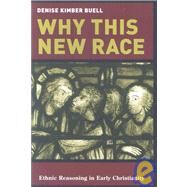Why This New Race
, by Buell, Denise K.- ISBN: 9780231133357 | 0231133359
- Cover: Paperback
- Copyright: 10/6/2008
Why This New Raceoffers a radical new way of thinking about the origins of Christian identity. Conventional histories have understood Christianity as a religion that from its beginnings sought to transcend ethnic and racial distinctions. Denise Kimber Buell challenges this view by revealing the centrality of ethnicity and race in early definitions of Christianity. Buell's readings of various texts consider the use of "ethnic reasoning" to depict Christianness as more than a set of shared religious practices and beliefs. By asking themselves, "Why this new race?" Christians positioned themselves as members of an ethnosor genosdistinct from Jews, Romans, and Greeks. Buell focuses on texts written before Christianity became legal in 313 C.E., including Greek apologetic treatises, martyr narratives, and works by Clement of Alexandria, Origen, and Tertullian. Philosophers and theologians used ethnic reasoning to define Christians as a distinct people within classical and ancient Near East society and in intra-Christian debates about what constituted Christianness. Many characterized Christianness as both fixed and fluid-it had a real essence (fixed) but could be acquired through conversion (fluid). Buell demonstrates how this dynamic view of race and ethnicity allowed Christians to establish boundaries around the meaning of Christianness and to develop universalizing claims that all should join the Christian people. In addressing questions of historiography, Buell analyzes why generations of scholars have refused to acknowledge ethnic reasoning in early Christian discourses. Moreover, Buell's arguments about the importance of ethnicity and religion in early Christianity provide insights into the historical legacy of Christian anti-Semitism as well as contemporary issues of race.







